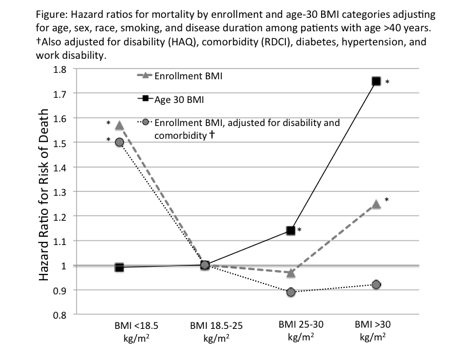Session Information
Date: Tuesday, November 7, 2017
Title: Rheumatoid Arthritis – Clinical Aspects Poster III: Comorbidities
Session Type: ACR Poster Session C
Session Time: 9:00AM-11:00AM
Background/Purpose:
Emerging evidence suggests that long-term weight loss is an important confounder that results in an underestimation of the risks of obesity in chronic illness. Methodologies that consider weight earlier in life may help address this epidemiologic challenge. This study evaluated weight histories of patients with RA and their relationship to mortality.
Methods:
Patients with RA were active participants from 1999 to 2016 and of age >40 years in the National Data Bank for Rheumatic Diseases. Current and age-30 height and weight were self-reported at each semi-annual questionnaire. Body mass index (BMI) and percent weight change from age-30 were calculated and classified based on previously defined categories. Multivariable Cox proportional hazards models assessed the relationships between BMI at enrollment and age-30 with mortality. Estimates of risk were also assessed before and after adjusting for disability (HAQ) and comorbidity (Rheumatology Disease Comorbidity Index [RDCI])- factors hypothesized to be in the causal pathway.
Results:
Among 12,679 participants (80% female), the mean (SD) age and disease duration were 59.9 (10.5) and 13.9 (12.4) years, respectively. There were 1,520 deaths in 80,502 person-years of follow-up. Relationships between BMI categories and mortality were distinct by time of assessment (Figure). For example, at enrollment, low BMI was associated with a greater risk of death (Table). In contrast, those with low age-30 BMI were not at greater risk. While obesity at enrollment was modestly associated with mortality [HR 1.25 (1.10, 1.42) p=0.001], an obese age-30 BMI was associated with a pronounced increase in risk [HR 1.75 (1.45, 2.11) p<0.001]. Weight loss since age-30 was a strong and dose-dependent predictor of mortality independent of enrollment BMI. Compared to normal BMI, an obese age-30 BMI was associated with greater disability and comorbidity scores and greater odds of diabetes, hypertension, and work disability at enrollment after adjusting for sex, race, and age at enrollment. Adjustment for disability and comorbidity resulted in even further potential underestimation of risks of obesity at enrollment [HR 0.92 (0.80, 1.06) p=0.24] (Figure).
Conclusion:
Lifetime weight histories expose substantial underestimation of the risks of obesity on mortality in clinical studies in RA. Systematic underestimation of risk is due to the confounding effects of long-term unintentional weight loss often observed due to aging and chronic illness and to the over-adjustment for factors that are likely to be in the causal pathway.
|
Table: Cox proportional hazard models evaluating the independent associations between BMI at enrollment and weight loss since age 30.*
|
||||
|
N=12,272; PY=78,152 |
Enrollment BMI
|
Enrollment BMI + Weight Change Since Age 30
|
||
|
BMI Category
|
||||
|
Underweight
|
1.56 (1.15, 2.14) |
0.005 |
1.05 (0.76, 1.46) |
0.76 |
|
Normal Weight
|
1 (reference) |
— |
1 (reference) |
— |
|
Overweight
|
0.97 (0.86, 1.09) |
0.70 |
1.07 (0.94, 1.22) |
0.32 |
|
Obese
|
1.25 (1.10, 1.42) |
<0.001 |
1.40 (1.20, 1.62) |
<0.001 |
|
Weight Change Since Age 30 |
||||
|
Increase 10%
|
— |
— |
0.86 (0.74, 0.99) |
0.04 |
|
Increase 5%
|
— |
— |
0.81 (0.68, 0.98) |
0.03 |
|
Stable
|
— |
— |
1 (reference) |
— |
|
Decrease 5%
|
— |
— |
1.30 (1.01, 1.66) |
0.04 |
|
Decrease 10%
|
— |
— |
1.89 (1.52, 2.37) |
<0.001 |
|
*All models adjusted for age, sex, white race, disease duration, and current smoking at enrollment. |
||||
To cite this abstract in AMA style:
Baker J, England BR, Mikuls TR, Michaud K. Weight Histories Expose the Systematic Underestimation of the Risks of Obesity on Mortality in Rheumatoid Arthritis [abstract]. Arthritis Rheumatol. 2017; 69 (suppl 10). https://acrabstracts.org/abstract/weight-histories-expose-the-systematic-underestimation-of-the-risks-of-obesity-on-mortality-in-rheumatoid-arthritis/. Accessed .« Back to 2017 ACR/ARHP Annual Meeting
ACR Meeting Abstracts - https://acrabstracts.org/abstract/weight-histories-expose-the-systematic-underestimation-of-the-risks-of-obesity-on-mortality-in-rheumatoid-arthritis/

